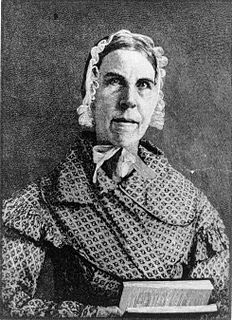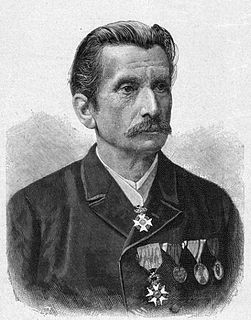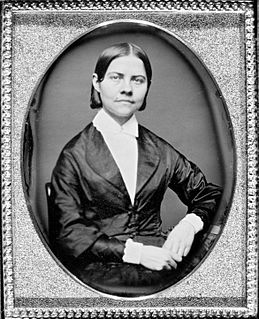A Quote by Sarah Moore Grimke
It would be as wise to set up an accomplished lawyer to saw wood as a business as to condemn an educated and sensible woman to spend all her time boiling potatoes and patching old garments. Yet this is the lot of many a one who incessantly stitches and boils and bakes, compelled to thrust back out of sight the aspirations which fill her soul.
Related Quotes
The tragedy of love is not death or separation. How long do you think it would have been before one or other of them ceased to care? Oh, it is dreadfully bitter to look at a woman whom you have loved with all your heart and soul, so that you felt you could not bear to let her out of your sight, and realize that you would not mind if you never saw her again. The tragedy of love is indifference.
I saw sensuality as sacred, indeed the only sacredness, I saw woman and her beauty as divine since her calling is the most important task of existence: the propagation of the species. I saw woman as the personification of nature, as Isis, and man as her priest, her slave; and I pictured her treating him as cruelly as Nature, who, when she no longer needs something that has served her, tosses it away, while her abuses, indeed her killing it, are its lascivious bliss.
Moving between her thighs, he stretched out above her, then thrust into her. Once. Because, as he did everything, he acted without hesitation or apology to claim her entirely. Her eyes went wide and her breath caught. Holding her gaze, he pressed himself deeper, barely easing back before pressing deep again.
She died that night. Her last breath took her soul, I saw it in my dream. I saw her soul leave her body as she exhaled, and then she had no more needs, no more reason; she was released from her body, and being released, she continued her journey elsewhere, high in the firmament where soul material gathers and plays out all the dreams and joys of which we temporal beings can barely conceive, all the things that are beyond our comprehension, but even so, are not beyond our attainment if we choose to attain them, and believe that we truly can.
Oh there's so many, but the one that I would love to see, that I would love to go up against, is Beth Phoenix. I would love for her to return. It would be something for me, kind of like a a childhood thing, growing up seeing her being such a dominant woman. I would love for her to show up and be in the ring with her.
To sew is to pray. Men don't understand this. They see the whole but they don't see the stitches. They don't see the speech of the creator in the work of the needle. We mend. We women turn things inside out and set things right. We salvage what we can of human garments and piece the rest into blankets. Sometimes our stitches stutter and slow. Only a woman's eyes can tell. Other times, the tension in the stitches might be too tight because of tears, but only we know what emotion went into the making. Only women can hear the prayer.
In her memoir, Anne Robinson recounts the wake-up call which motivated her to stop drinking. Leaving her eight-year-old daughter alone in their car while she went to buy liquor, she returned to find her daughter with tears running down her cheeks. The guilt and horror Ms. Robinson felt at this sight jolted her into sobriety.
She’s really gone, then. The little girl with the back of her shirt sticking out like a duck tail, the one who needed help reaching the dishes, and who begged to see the frosted cakes in the bakery window. Time and tragedy have forced her to grow too quickly, at least for my taste, into a young woman who stitches bleeding wounds and knows our mother can hear only so much.
But that wasn´t the first time I ever saw her. I saw her in the hallways at school, and at my mother’s false funeral, and walking the sidewalks in the Abnegation sector. I saw her, but I didn’t see her; no one saw her the way she truly was until she jumped. I suppose a fire that burns that bright is not meant to last.
Women are in bondage; their clothes are a great hindrance to their engaging in any business which will make them pecuniarily independent, and since the soul of womanhood never can be queenly and noble so long as it must beg bread for its body, is it not better, even at the expense of a vast deal of annoyance, that they whose lives deserve respect and are greater than their garments should give an example by which woman may more easily work out her own emancipation?
Of all the old prejudices that cling to the hem of the woman's garments and persistently impede her progress, none holds faster than this. The idea that she owes service to a man instead of to herself, and that it is her highest duty to aid his development rather than her own, will be the last to die.





































